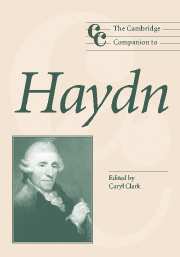6 - Haydn's exoticisms: “difference” and the Enlightenment
from Part II - Stylistic and interpretive contexts
Published online by Cambridge University Press: 28 September 2011
Summary
In Persia, a sofa married an easy chair; the Indians of the Molucca Islands Fashion wigs from wire; in China, a Muscovite man gave birth, while a satrap in the Indies was impaled for making love – so reads aloud Sempronio, the pharmacist in Haydn's Lo speziale (1768), from his newspaper. The librettist, Carlo Goldoni, at once indulges and ridicules his period's fascination with the fabulous, unnatural, and irrational incidents in far-flung climes reported in journalism and travel writings. Goldoni parodies Sempronio's gullibility, and implies that the pharmacist's preoccupation with world news renders him oblivious to events closer to home. As Sempronio reorganizes the war-torn world with the help of a compass and globe, his unqualified assistant mixes and muddles the potions that his master will dispense. Sempronio's fanciful internationalism blinds him to Mengone's designs on his ward, Grilletta. Indeed, Sempronio's fascination with the exotic makes him an easy target when Mengone sues for Grilletta's hand in the exalted costume of a Turkish ambassador. Mengone is not the only suitor to don Turkish disguise in the hope of winning over Grilletta's reluctant guardian. Masquerading as an ambassador to the “King of Moluccas,” Volpino (a frequent visitor to the pharmacy) offers Sempronio a job in Turkey as the King's pharmacist. Volpino's related aria “Salamelica, Semprugna cara” (Act III) begins with Italian-derived gibberish, standing in for Turkish, while the last two lines refer ungrammatically to singing and dancing, as if in celebration of the impending wedding.
- Type
- Chapter
- Information
- The Cambridge Companion to Haydn , pp. 77 - 92Publisher: Cambridge University PressPrint publication year: 2005
- 3
- Cited by

